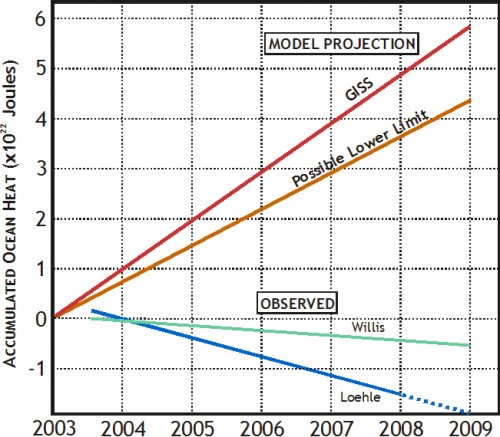William DiPuccio has a really very readable and clear post on using ocean heat content to falsify current global warming model projections. He argues pretty persuasively that surface air temperature measurements are a really, really poor way to search for evidence of a man-made climate forcing from CO2.
Since the level of CO2 and other well-mixed GHG is on the rise, the overall accumulation of heat in the climate system, measured by ocean heat, should be fairly steady and uninterrupted (monotonic) according to IPCC models, provided there are no major volcanic eruptions. According to the hypothesis, major feedbacks in the climate system are positive (i.e., amplifying), so there is no mechanism in this hypothesis that would cause a suspension or reversal of overall heat accumulation. Indeed, any suspension or reversal would suggest that the heating caused by GHG can be overwhelmed by other human or natural processes in the climate system….
[The] use of surface air temperature as a metric has weak scientific support, except, perhaps, on a multi-decadal or century time-scale. Surface temperature may not register the accumulation of heat in the climate system from year to year. Heat sinks with high specific heat (like water and ice) can absorb (and radiate) vast amounts of heat. Consequently the oceans and the cryosphere can significantly offset atmospheric temperature by heat transfer creating long time lags in surface temperature response time. Moreover, heat is continually being transported in the atmosphere between the poles and the equator. This reshuffling can create fluctuations in average global temperature caused, in part, by changes in cloud cover and water vapor, both of which can alter the earth’s radiative balance.
One statement in particular really opened my eyes, and made me almost embarassed to have focused time on surface temperatures at all:
For any given area on the ocean’s surface, the upper 2.6m of water has the same heat capacity as the entire atmosphere above it
Wow! So oceans have orders of magnitude more heat capacity than the atmosphere.
The whole article is a good read, but his conclusion is that estimates of ocean heat content changes appear to be way off what they should be given IPCC models:
My only concern with the analysis is that I fear the authors may be underestimating the effect of phase change (e.g. melting or evaporation). Phase change can release or absorb enormous amounts of heat. As a simple example, observe how long a pound of liquid water at 32.1F takes to reach room temperature. Then observe how long a pound of ice at 31.9F takes to reach room temperature. The latter process takes an order of magnitude more time, because it absorbs an order of magnitude more heat.
The article attached was necessarily a summary, but I am not totally convinced he has accounted for phase change sufficiently. Both an increase in melting ice as well as an increase in evaporation would tend to cause measured accumulated heat in the oceans to be lower than expected. He uses an estimate by James Hansen that the number is really small for ice melting (he does not discuss evaporation). However, if folks continue to use Hansen’s estimate of this term to falsify Hansen’s forecast, expect Hansen to suddenly “discover” that he had grossly underestimated the ice melting term.

